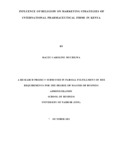| dc.description.abstract | At the moment, companies are facing increasing competition because of changing political, legal, socio-economic, cultural and trading environments thus ushering in new challenges for businesses. This means that those who are able to detect the changes in the environment and change their strategies as the market dictates will survive. This requires constant and precise reading and scanning of the environment and the consumer’s behavior so that they can deliver the greatest value to customers. As the operating environment changes; a more pronounced transformation of the business landscape lies ahead. Therefore, strategy becomes vital to the adaptation of the changing business environment. The pharmaceutical industry in Kenya has undergone numerous changes since being liberalized in the early 1990s. There has been an influx of many pharmaceutical companies into the market, either as direct investments or through franchise holders. The product range within the industry has widened greatly to meet the ever increasing consumer needs.
The industry has been characterized by many changes and an increasingly turbulent environment. The configuration of competitive forces such as intensity of competition, new entrants, substitute products and supplier and buyer power have transformed the environment a great deal, creating the need for firms to change their competitive positions (Wamalwa, 2009). In response to competition, firms in Kenya have taken measures such as improved product quality, improved product design, branding and brand extensions, provision of affordable products and increased customer focus. In the pharmaceutical industry, responses by firms to competitive pressure have taken such forms as price reduction, offering discounts and bonuses on their various product
x
offerings. In some cases the multinationals have opted to exit particular markets and instead work through a distributor to avail their products to the consumers. This shows that the pharmaceutical industry is very competitive and survival of any firm depends on how best it understands the perception of consumers about product attributes and how these perceptions influence consumers’ purchase decisions.
Culture is that whole complex of distinctive, spiritual material, intellectual and emotional features characterizing a society or social group. This definition encompasses in addition to art and literature, lifestyles, way of living together, value accepted, systems, traditions and beliefs (Office of VP, Ministry of state for National heritage & Culture, 2009). The Kenyan Cultural policy recognizes culture as a repository of knowledge which is manifested in all aspects of life as a guide to evolution of morals, attitudes, beliefs and values in the society. Societies with a dominantly protestant faith have traditionally been richer than others partly due to the high value attributed to individual economic achievement which is considered God’s blessings (Onkvisit & Shaw, 2002). Islamic societies (with the exception of oil rich countries) have traditionally been rather poor. This is partly due to religious belief that wealth is to be used to satisfy basic needs in moderation thus material status does not entail higher status or merit. This must be understood by international marketers in the process of evaluating the attractiveness of the country markets (Deresky, 2008).
This study will investigate the influence of religion on marketing strategies employed by international pharmaceutical firms in Kenya. It is based on the assumption that the pharmaceutical industry targets all cultures and religions. My objective is to build on what is currently practiced and update the existing knowledge. This will assist us to
xi
determine the extent of religion’s influence on marketing strategies formulation in the pharmaceutical industry in Kenya. As this will be a survey on international pharmaceutical companies, data shall be collected by way of a structured questionnaire through one to one interviews to facilitate probing for greater detail. Population under study will be international pharmaceutical firms which are registered to trade in Kenya thus submit necessary taxes to the government in their name and not through a distributor. It will benefit managers in the pharmaceutical industry, academicians, government and other related sectors thus provide a foundation for further related studies. | en_US |



